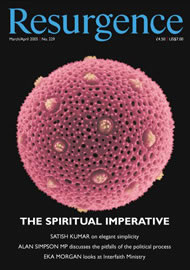THE WESTERN VERSION of development and wealth-creation promotes itself as a purely secular phenomenon. The violence it provokes in many pious or devout followers of religion strikes its proponents as gratuitous and inexplicable. How is it possible that fanatics and extremists respond in this way to processes that are directed solely to the material betterment of humankind?
The truth is, the global way of wealth is not secular. Those who want to remake the whole world in the image of the Western societies base their project on perpetual economic growth: on permanent expansion and a limitless capacity to produce. This is believed to correspond to 'human nature', the insatiable desires of humanity, and its boundless yearnings.
Now, any dealings with perpetuity, insatiability, permanence and the infinite are clearly not of this world. When these are promoted as the stuff of mere material endeavour, they are seen by believers in other creeds as aggressive and insulting, an invasive trespass upon the realm of religion.
It may well be asked whether faith in infinite economic growth, and an economy that can - and must - continue in the same way indefinitely is a more refined belief, or superstition, than any other.
So when the disingenuous economic missionaries go forth from the international financial institutions in order to share the mysterious arts of wealth-creation, the good news they bring to their converts is not merely the necessity of deregulating the economy. This must be accompanied by the deregulation of desire, the opening up of the brimming reservoirs of repressed human wanting: all that has been denied through long millennia of impoverishment and want.
In this, no clear distinction is made between those desires which can be answered in the material sphere, and those which cannot; indeed, a certain confusion remains between the longing for security and sufficiency (which are possible, but not necessarily within the existing paradigm) and deeper, existential longings, for permanence and freedom from pain and loss (which cannot be answered at all in this life).
In this way, what appear as prosaic, apparently technocratic solutions - enhanced productivity, free markets and liberalisation - encroach violently upon the terrain of faiths which have always taught the limits of the attainable, self-restraint, abstinence and discipline.
THIS SHOULD COME as no surprise to us, since the aggressive doctrines of capitalism also once upon a time violated ground sacred to the Christian faith, before a majority of Christians had become wise enough to understand that avarice was a virtue, that usury was indispensable for accumulation, and that the fair price and the just wage must yield to what the market would bear. The development of capitalism was sustained for a considerable time by the contortions of its divine roots, even as these withered beneath the abundant fruits by which it made itself known to the world.
The social virtues of frugality, thrift and avoidance of excess long retained a serviceable link with religious teachings even within capitalism, until these, too, had to be swept away by the more urgent economic necessities of the voracious cult of consumerism. If we, too, in the West, have been caught up in economic compulsions which are at odds with our own religious tradition, at least these evolved relatively slowly, and from within. They were not brought from elsewhere by the transforming zeal of the overlords of Earth.
Exhortations to curb appetite, to temperance and moderation have characterised religions - Islam, Hinduism, Buddhism, Jainism, and especially the animism of indigenous people everywhere, who sacralised the environment of forests, streams and earth that sustained them. When these values are challenged, or brutally vanquished by a nominally 'secular' creed, this is quite correctly perceived to be not secular at all. It is an assault upon ancient conviction and practice, and confrontation is inevitable. It is experienced as both a perversion of human purposes and an invasion of the sanctity of creation. In this context, the 'creation of wealth' appears not as the triumphant conquest by industrial society of the natural world, but as a profanation of it.
It should not be expected that the leaders of the West possess much insight into the inflammatory effects of their teachings upon the faith of others. But they should understand that it is taken as a declaration not only of cultural but also of religious war. It is not that such people 'hate our freedom', in the reductive formulation of George W. Bush. What they do hate is the freedom we have seized to desecrate sacred ground, which we - to the detriment of ourselves, as well as to all other occupants of the planet - no longer recognise as such. When the West appears no longer to perceive a distinction between wants which are amenable to material answers and those which address the great puzzles of human existence, the reaction to their moral and spiritual blindness is bound to be violent. It is surely for the West to explain to a world bidden to follow it in its intensifying destructive adventures the purposes of its quest to discover what lies on the other side of the ruin of the sources and resources of life on Earth.
IT IS NOT with secularism that a majority of the world's people have any quarrel, but with a quasi-religious proselytising masquerading as secularism, and with the deformed spiritual intent enfolded within it. It is significant that the West could not swiftly enough rid the world of its only other 'secular' rival; and one of its most virulent criticisms was to point out that the 'godless creed' of Communism had itself mutated into a totalising mimicry of religious faith. This has not prevented the Western belief system from following a similar path.
This usurpation of religious concerns is presented as though it had solely to do with the realm of the material, although in no other culture than the industrial have the material and spiritual ever been thought to be so crudely separable.
It is true that the unearthly objective of Western ideology usually clothes itself in the more comely guise of democracy and freedom. But these do not conceal the shape or scope of its other-worldly pretensions - to mine a finite world in the pursuit of infinite economic growth.
This is how the fires of religious rage are stoked, even by those who claim that they want to see greater fairness and justice in the world, for the system through which these noble goals are to be reached is itself a bearer of unavowed pseudo-religious zealotry. They are bound to be mystified by the response of the self-immolation of fundamentalists who die with words of martyrdom and brotherhood on their blasphemous lips. Acts of terror are not necessarily evidence of the gratuitous nihilism they are made out to be. They may be rancorous reactions of the powerless to a sacrilegious violence, of which the perpetrators profess an equivocal and apparently unconscious innocence. o








